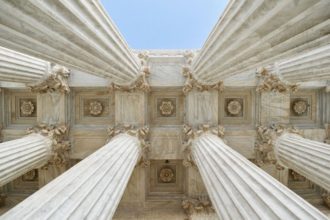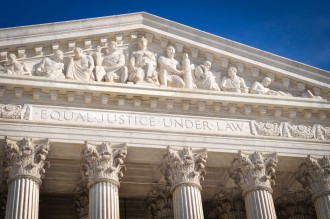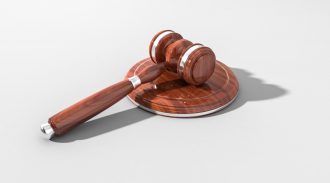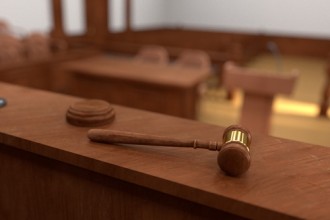
April 24, 2019
Supreme Court Set to Decide if USPTO Can Make Patent and Trademark Applicants Pay Its Attorneys’ Fees in Civil Actions
On March 4, 2019, the Supreme Court agreed to hear Iancu v. NantKwest. In NantKwest, the Court must decide if the words “all expenses,” as used in Patent Act §145, providing for civil actions against the USPTO by dissatisfied patent applicants, allows the USPTO to recover its attorneys’ fees in the form of a pro-rated amount of its lawyers’ salaries.
This case is tied to an unprompted change in USPTO policy made sometime in 2013. Applicants unhappy with a decision of the USPTO’s Patent Trial and Appeal Board (“PTAB”) or Trademark Trial and Appeal Board (“TTAB”) can appeal those decisions to the Court of Appeals for the Federal Circuit (“CAFC”) or they can initiate a civil action against the USPTO in the United States District Court for the Eastern District of Virginia (“ED VA”). Civil action challenges to TTAB decisions in inter partes cases are also available.
Although these provisions of the Patent and Trademark Acts have existed for many years and have not been changed recently, in 2013 the USPTO began asking the district court to award it its attorneys’ fees as part of “all” of its expenses. In January 2014, the ED VA granted this request in Shammas v. Focarino and ordered Shammas to pay the USPTO $36,320.49, which included the USPTO’s attorneys’ fees. Shammas appealed that decision to the Court of Appeals for the Fourth Circuit (“4th Circuit”), the geographically corresponding court of appeals for federal district courts in Virginia and other surrounding states.
In a 2-1 decision, the 4th Circuit declined to apply the “American Rule” and affirmed the ED VA’s ruling. The American Rule is that parties shall pay their own attorneys’ fees, win or lose, although Congress can make statutory exceptions. Here, the USPTO argued that the “all expenses” statutory language was one such exception. The 4th Circuit held that because the provision of the Trademark Act at issue allowed the USPTO to recover all of its expenses, whether the USPTO prevailed in the district court or not, the American Rule did not apply. In the absence of the Rule, the court looked to the plain meaning of the words and decided they included attorneys’ fees. The history of the 1839 amendment to the Patent Act that created the Patent Act’s parallel §145 provision helped convince the court in reaching this decision. Accordingly, the 4th Circuit affirmed the attorneys’ fees award to the USPTO. The dissent, however, thought the American Rule should apply, as it is a well-settled principle that the dissent traced back to a Supreme Court decision from the 18th Century. In a footnote, the dissent mentions that the USPTO admits that, prior to 2013, the USPTO had never sought attorneys’ fees under these provisions.
In 2016, following the TTAB’s affirmance of the USPTO’s refusal to register four trademark applications for the BOOKING.COM mark, Booking.com also took its case to the ED VA rather than the CAFC. Unlike Shammas, Booking.com largely prevailed at the district court, with the ED VA ruling that its mark was not generic and that Booking.com’s evidence of acquired distinctiveness was sufficient for one of the two classes of services in its applications.
Undeterred by its loss, the USPTO filed a motion for its expenses of $76,873.61, including its attorneys’ fees. Booking.com tried to distinguish its case from the Shammas ruling, but ultimately the ED VA felt bound by the Shammas decision and awarded the USPTO the attorneys’ fees. Booking.com then took its case to the 4th Circuit. Although the 4th Circuit opinion noted that the ED VA had issued a contrary ruling in the ongoing NantKwest case and that a Supreme Court case issued after its Shammas decision might call Shammas into question, the court again affirmed the attorneys’ fees award.
At largely the same time that Booking.com was challenging the USPTO in its trademark case, NantKwest was fighting the USPTO’s rejection of its patent application for a cancer treatment method. After the PTAB affirmed the bulk of the USPTO’s rejection, NantKwest also went to the ED VA rather than appeal the case to the CAFC. Even though NantKwest lost its challenge to the rejection at summary judgment, this time the ED VA denied the USPTO’s request for its attorneys’ fees. Because appeals in patent cases go to the CAFC and not the geographically corresponding court of appeals, Shammas was not binding precedent. In NantKwest v. Lee, the ED VA refused the USPTO’s request for $78,592.50 in attorneys’ fees because §145 of the Patent Act did not have a specific and explicit provision for attorneys’ fees that would outweigh the application of the American Rule. The use of the words “all expenses” did not persuade the court that Congress intended to include attorneys’ fees. Shammas also failed to convince the court, with the opinion calling the decision “erroneous.”
On appeal at the CAFC (this being a patent case), a three judge panel reversed the denial of attorneys’ fees 2-1. Chief Judge Prost, writing for the majority, had “substantial doubts” that the American Rule applied, importing the logic of Shammas. Nonetheless, her ruling applied the American Rule, but still found that the USPTO should receive its attorneys’ fees. While examples of expenses and attorneys’ fees provisions from other statutes cut both ways, the court held that Congress’ use of “all expenses” was sufficient because the law did not require a particular wording to deviate from the American Rule. The opinion noted policy concerns about shifting financial burdens onto other parties, which would be in conflict with the “heavy economic burden” §145 placed on applicants according to a previous CAFC decision.
Judge Stoll’s dissent identified the American Rule as a “bedrock principle” of American law. In the absence of specific fee-shifting language, the ordinary meaning of expenses and §145’s legislative history did not persuade her that this principle should not be applied in this case.
Following the panel decision, the CAFC sua sponte decided to re-hear the case en banc. Judge Stoll, now writing for a 7-4 majority, reiterated many of her arguments from the panel dissent in the en banc opinion. The en banc opinion applies the American Rule and finds the statutory language insufficient to displace the Rule. Judge Stoll questions whether legislative history is instructive in this scenario, where the statute must clearly shift the fees. But even if the legislative history is relevant, the context around §145 does not justify deviation from the American Rule, according to Judge Stoll. Chief Judge Prost, now in dissent, maintains that “all the expenses” is a clear instruction and that the majority’s view is overly restrictive. Recognizing the 170 plus year history of §145 without the USPTO attempting to recover its attorneys’ fees under the provision, she says that the USPTO never disclaimed the ability to do so and that changing circumstances provide good reason for the change.
Now at the Supreme Court, briefing in this case is currently set to begin next month and run to the fall. Interestingly, NantKwest is being represented by the former firm of Director Iancu, who is the named petitioner in this case.
On the same day it agreed to hear NantKwest, the Supreme Court released its opinion in Rimini Street v. Oracle. At trial, Oracle requested as costs things that were outside the general federal costs statute. The trial court, later affirmed by the 9th Circuit, found that this was justified, in part, because the Copyright Act provided for the award of the “full costs.” A unanimous Supreme Court ruled that the general federal costs statute provided a clear default rule and that, absent authority in the statute, the trial court could not deviate from that default rule. The Court rejected Oracle’s arguments that the use of “full” made a difference, that this reading of the statute made “full” surplusage, and that “full costs” was a historical term of art in the Copyright Act with a different meaning than the costs enumerated in the general statute. The Court’s rejections of these arguments does not bode well for the USPTO, but we will likely have to wait until next year to find out if patent and trademark applicants must bear this additional financial burden to make use of the civil action option to vindicate their rights.




































